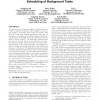Free Online Productivity Tools
i2Speak
i2Symbol
i2OCR
iTex2Img
iWeb2Print
iWeb2Shot
i2Type
iPdf2Split
iPdf2Merge
i2Bopomofo
i2Arabic
i2Style
i2Image
i2PDF
iLatex2Rtf
Sci2ools
109
click to vote
SIGMETRICS
2009
ACM
2009
ACM
Restrained utilization of idleness for transparent scheduling of background tasks
A common practice in system design is to treat features intended to enhance performance and reliability as low priority tasks by scheduling them during idle periods, with the goal to keep these features transparent to the user. In this paper, we present an algorithmic framework that determines the schedulability of non-preemptable low priority tasks in storage systems. The framework estimates when and for how long idle times can be utilized by low priority background tasks, without violating pre-defined performance targets of user foreground tasks. The estimation is based on monitored system information that includes the histogram of idle times. This histogram captures accurately important statistical characteristics of the complex demands of the foreground activity. The robustness and the effectiveness of the proposed framework is corroborated via extensive trace driven simulations under a wide range of system conditions and background activities, and via experimentation on a Linux...
| Added | 28 May 2010 |
| Updated | 28 May 2010 |
| Type | Conference |
| Year | 2009 |
| Where | SIGMETRICS |
| Authors | Ningfang Mi, Alma Riska, Xin Li, Evgenia Smirni, Erik Riedel |
Comments (0)

